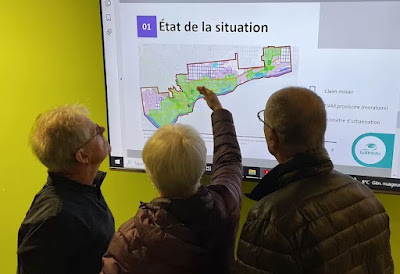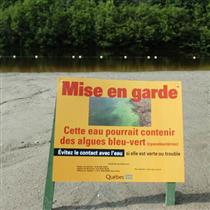Mining claim 'boom' pits prospectors against public in suburban Gatineau
Gatineau, Que., is seen from downtown Ottawa in this drone image taken in July. A large swath of the city's north-eastern sector has been claimed for possible mineral exploration. (Michel Aspirot/CBC)This map shows active claims belonging to Beauce Gold Fields in purple. Also shown are historical mine sites including one labelled 'McVeity & Taylor' where Levasseur says phosphate was extracted in the late 19th century. (Beauce Gold Fields)
This map shows active mining claims in Quebec as of October. Claims bordering lakes, rivers and shorelines are shown in red. Others are in green. (MiningWatch Canada)
Some 200 people packed a public information session in Gatineau last month to learn more about recent mining claims encompassing their neighbourhoods in the city's north-east sector. (Nelly Albérola/Radio-Canada)
Mining claim 'boom' pits prospectors against public in suburban Gatineau
Exploration company with dozens of claims says nothing will proceed without 'social acceptability'
Exploration company with dozens of claims says nothing will proceed without 'social acceptability'
Alistair Steele
November 28, 2023
CBC News
CBC News
The head of a Montreal-based mineral exploration company is reassuring hundreds of residents of Gatineau, Que., that it has no immediate plans to mine for phosphate, a vital and increasingly sought-after component of electric car batteries, in the ground beneath their homes.
In June, the City of Gatineau sent letters to 722 property owners, many living in the eastern Limbour and Bellevue districts north of Autoroute Guy-Lafleur (formerly Autoroute 50), informing them that the land under their feet had been claimed for possible exploration.
"Taking a claim doesn't necessarily equal a mine." - Patrick Levasseur, Beauce Gold Fields
In Quebec as in other jurisdictions, the province owns the subsurface and controls exploration rights to it, even beneath private property. For less than $75, anyone can "stake" a claim, typically 50 hectares in area, using an online registry administered by Quebec's Ministry of Natural Resources and Forests.
Once a claim has been staked, the holder has exclusive exploration rights there for three years, with an option to renew their claim as long as they've met certain limited conditions. The landowner must consent to any exploration, but neither the claim holder nor the province is under any obligation to inform them that a claim has been registered.
A mining claim 'boom'
Quebec's free-mining approach, coupled with the urgent demand for raw materials such as graphite and phosphate used in the production of EV batteries, has helped spark what industry watchers are calling a boom in exploration claims in the province.
According to a coalition of mining industry watchdogs, there are currently 338,000 active claims across Quebec. The same groups have noted a particularly dramatic increase in claims in the Outaouais.
In August 2022, the coalition reported a 211 per cent rise in claims in the region over the previous 18 months and called for a moratorium. In October, the Ministry of Natural Resources and Forests reported 5,766 active mining claims in the Outaouais, covering roughly nine per cent of the region's total area.
Most of those are in remote areas, where some concerned landowners have taken to staking claims on their own property to prevent exploration companies from getting there first.
While dense urban areas are already exempt from mineral exploration under the province's mining laws, that protection only extends to land that was included within a municipality's urban boundary on Dec. 10, 2013. Gatineau expanded its urban area to include land north of Autoroute Guy-Lafleur in 2015, so it has remained open to mining claims.
By the time most residents discovered that, however, it was already too late.
Residents worried
Earlier this year, Beauce Gold Fields, a publicly traded mineral exploration company with headquarters in Montreal and a long history in southern Quebec's Beauce region, staked 42 separate claims in the area. (Another individual has staked eight more claims nearby, while Radio-Canada reports a total of 85 claims within Gatineau's urban boundary.)
About 200 residents attended a public information session organized by the city last month to learn more, but Christine Prégent was among those who left the meeting with lingering concerns.
"Our homes are the biggest investment of our lives," she told Radio-Canada in French. "We don't want to find ourselves in a situation where we're handcuffed by entering into an 'agreement' with a mining company, because ultimately they have the right to expropriate."
Julie Reid Forget, a mining industry expert invited to help lead the meeting, said it appears the recent claims simply weren't on the city's radar.
"I think it was a blind spot," she told CBC last week. "I think they were taken by surprise, but also there's not many people who believe that there's a mining company that would do mining near a large city."
It's so unusual that Reid Forget believes the situation in Gatineau is a first in Quebec.
For now, the city has placed a renewable six-month freeze on further claims within its new urban boundary, and is seeking a permanent solution by having the entire urban area declared exempt from exploration through a process known as TIAM — territoire incompatible avec l'activité minière, or territory incompatible with mining activity.
A municipality can ask the province to grant a TIAM if it believes mining activity could threaten an area of historical or cultural significance, interrupt existing economic activity such as maple syrup production, or infringe on densely populated areas.
Gatineau must submit its TIAM request to the province along with its larger development plan, an approval process one spokesperson acknowledged "could take some time."
'We're not talking about a mine tomorrow'
Meanwhile, the president, CEO and co-founder of the company holding many of the claims that have come under scrutiny says residents shouldn't worry.
"Taking a claim doesn't necessarily equal a mine. We take a lot of claims," said Patrick Levasseur of Beauce Gold Fields.
Levasseur confirmed last week that his company staked the claims in pursuit of phosphate, a mineral that was traditionally used in fertilizers but is currently making a comeback as a key component of lithium iron phosphate batteries.
The claims are in an area where phosphate was mined in the late 19th century, Levasseur said, long before Gatineau's urban footprint began to encroach.
"There was a time this was a rural area, and now it's urban. And Mother Nature doesn't put mineral deposits exactly where we'd like them to be," he said.
Levasseur said the claims are among some 400 that Beauce Gold Fields reserved in a staking "binge" earlier this year. He said the company spent the summer concentrating on its gold claims.
"We haven't had an opportunity to actually look and take inventory of all the phosphate properties that we've claimed," he said, noting the company currently has 29 such sites across the province, including ones in Saguenay–Lac-Saint-Jean and the Gaspésie.
He said those claims in eastern Quebec are more likely to yield extractable mineral deposits than the ones in the Outaouais.
Levasseur also noted that even if the Gatineau claims reach the preliminary exploration stage, the company requires the written consent of the property owner.
"If we don't have their consent, nothing happens. It's quite simple," he said. "People can rest assured, we're not talking about a mine tomorrow. It doesn't work that way."
Industry watchers wary
According to the Ministry of Natural Resources and Forests, in 2022 only 14 per cent of claims proceeded to the exploration stage. Levasseur, quoting an industry source, said less than one per cent of claims result in mining activity.
But some groups that monitor the mining industry say the situation in Gatineau illustrates the tenuous protection offered to municipalities under a legal framework that tends to favour mineral exploration.
"It's always what the industry's saying, that not all of the mining claims lead to exploration," said lawyer Rodrigue Turgeon, national program co-lead with MiningWatch Canada.
"For the citizens of Gatineau, the only outcome that would satisfy them or reassure them is that the mining claims would be withdrawn or bought out."
In a response to questions from CBC last week, Quebec's Ministry of Natural Resources and Forests confirmed in French that "mining exploration is indeed possible in this area," but reiterated that claim holders first need the written permission of landowners.
The ministry said it's had "numerous discussions" with municipal officials and "supports the City of Gatineau in its work to demarcate territories incompatible with mining activity."
In a French statement provided to Radio-Canada last month, Natural Resources and Forests Minister Maïté Blanchette Vézina said she's "sensitive" to concerns about the sudden boom in mining claims.
"It's clear that ... we must improve the claims process to allow mining projects that Quebecers can support and be proud of," the minister said.
Improving the process
The ministry embarked on a series of public consultations last spring to gather feedback on the province's mining laws, collecting some 2,500 responses that included a wide range of ideas for improvements.
Louis St-Hilaire, spokesperson for the Coalition québécoise des lacs incompatibles avec l'activité minière, a group that monitors mining activity in Quebec's vast lake regions, agreed it appears the claims took the City of Gatineau and its residents by surprise.
"I think the reason is that the municipality never believed that there could be claims so close to it," he said.
St-Hilaire's group is calling for the province's mining laws to be further amended to allow the government to cancel claims in areas that lack "social acceptability" — a term commonly used in the province to describe public support for mining activity — as well as an early warning system that would compel exploration companies to inform residents of claims from the very start of the process.
"There's no protection for the citizens, and the mining industry has priority over everyone," he said. "They have control of the territory, so this has to change."
Reid Forget, the expert brought in last month to brief Gatineau residents on their rights, agrees the system is tilted in favour of the mining industry.
"Personally, I find it odd that the municipality has to prove more than the mining company," she said. "There's no equity there."












Aucun commentaire:
Publier un commentaire